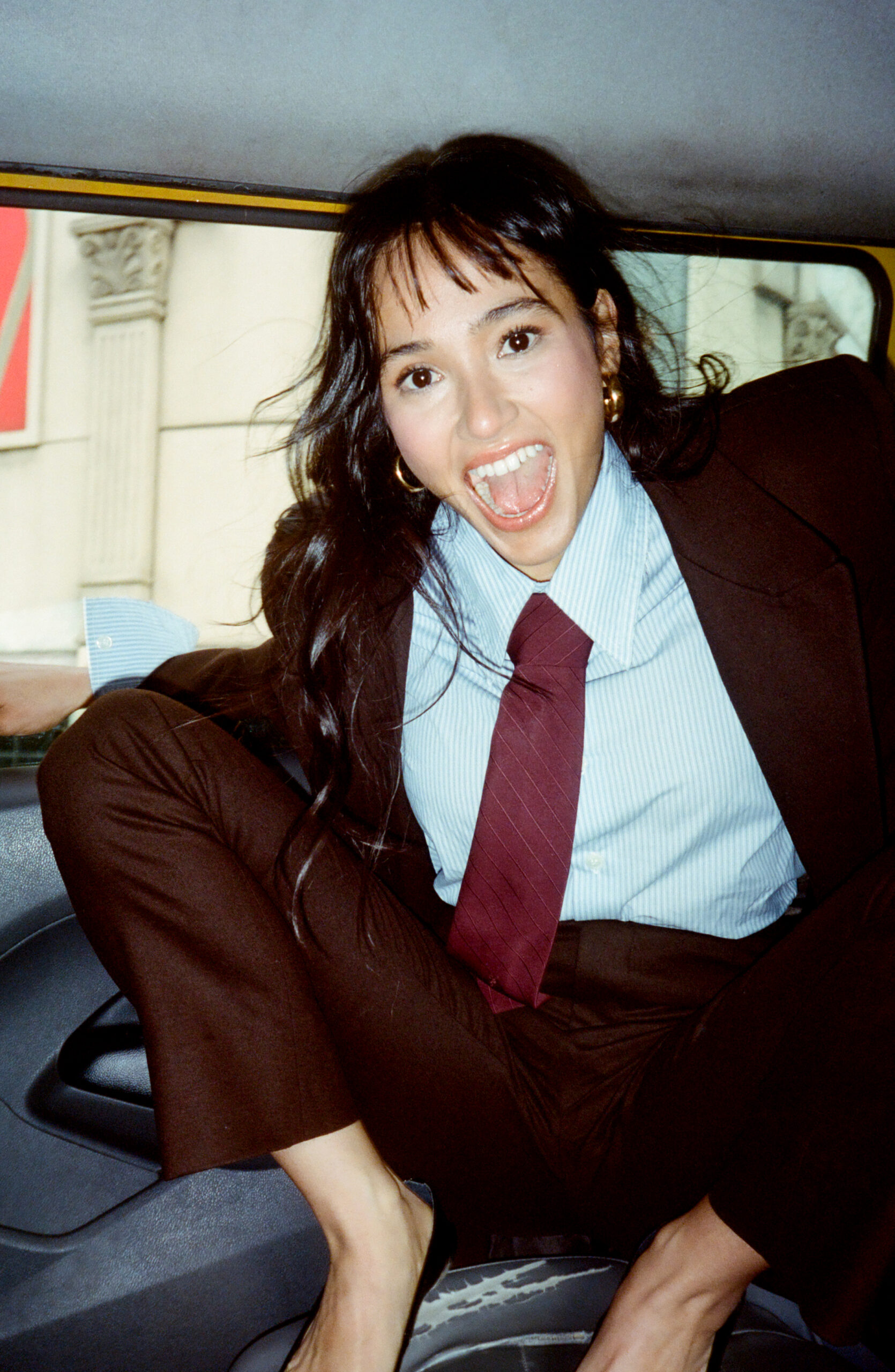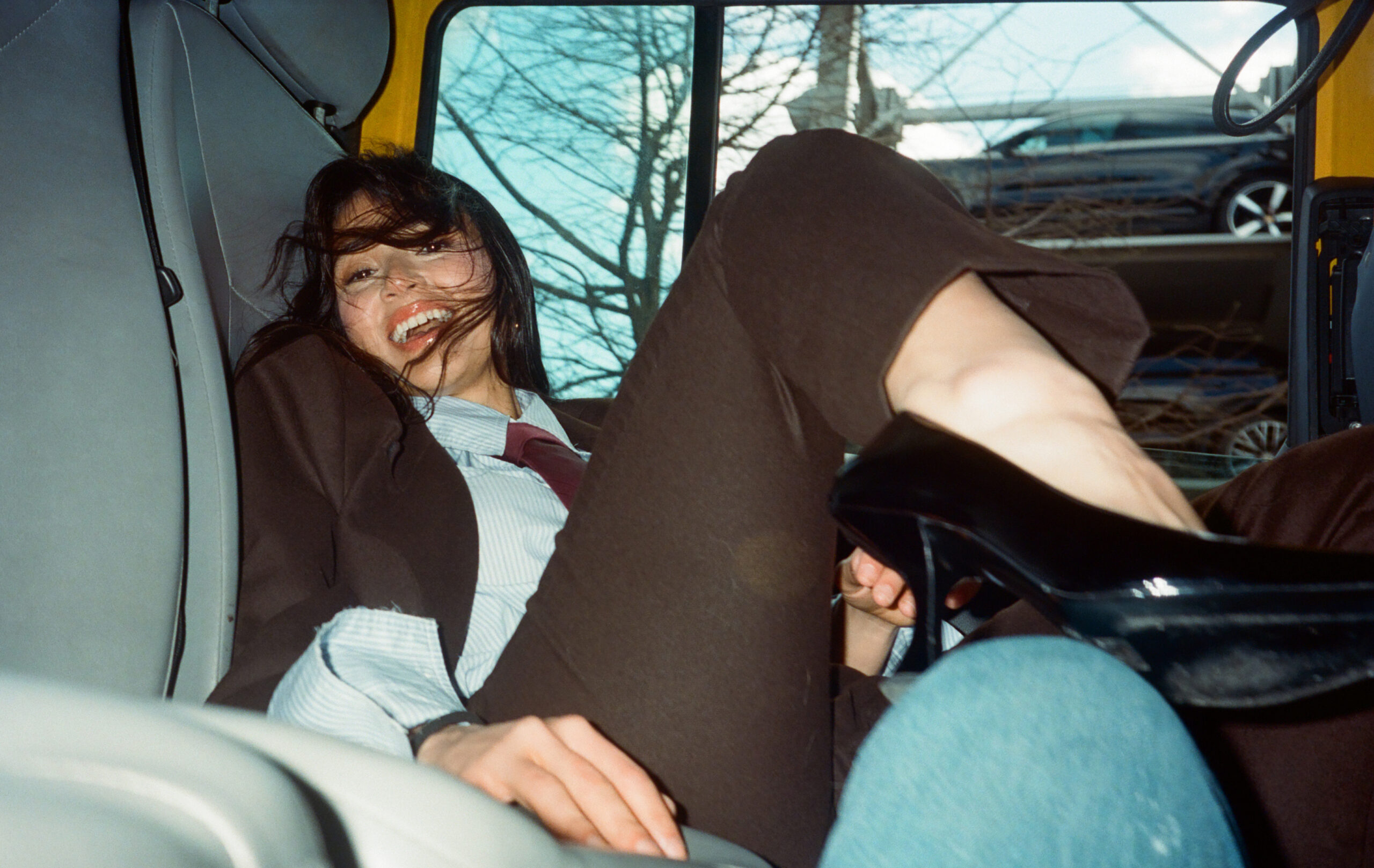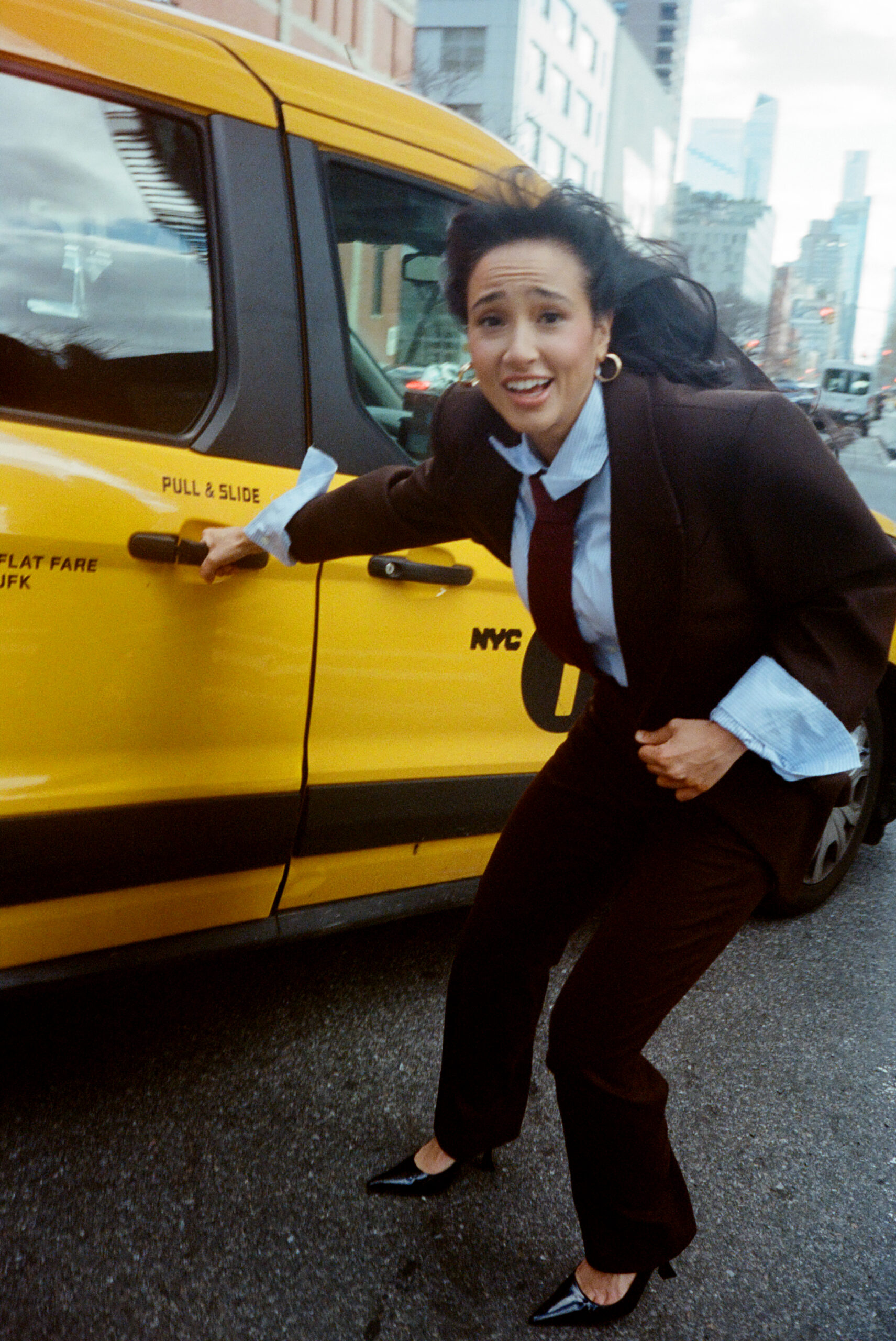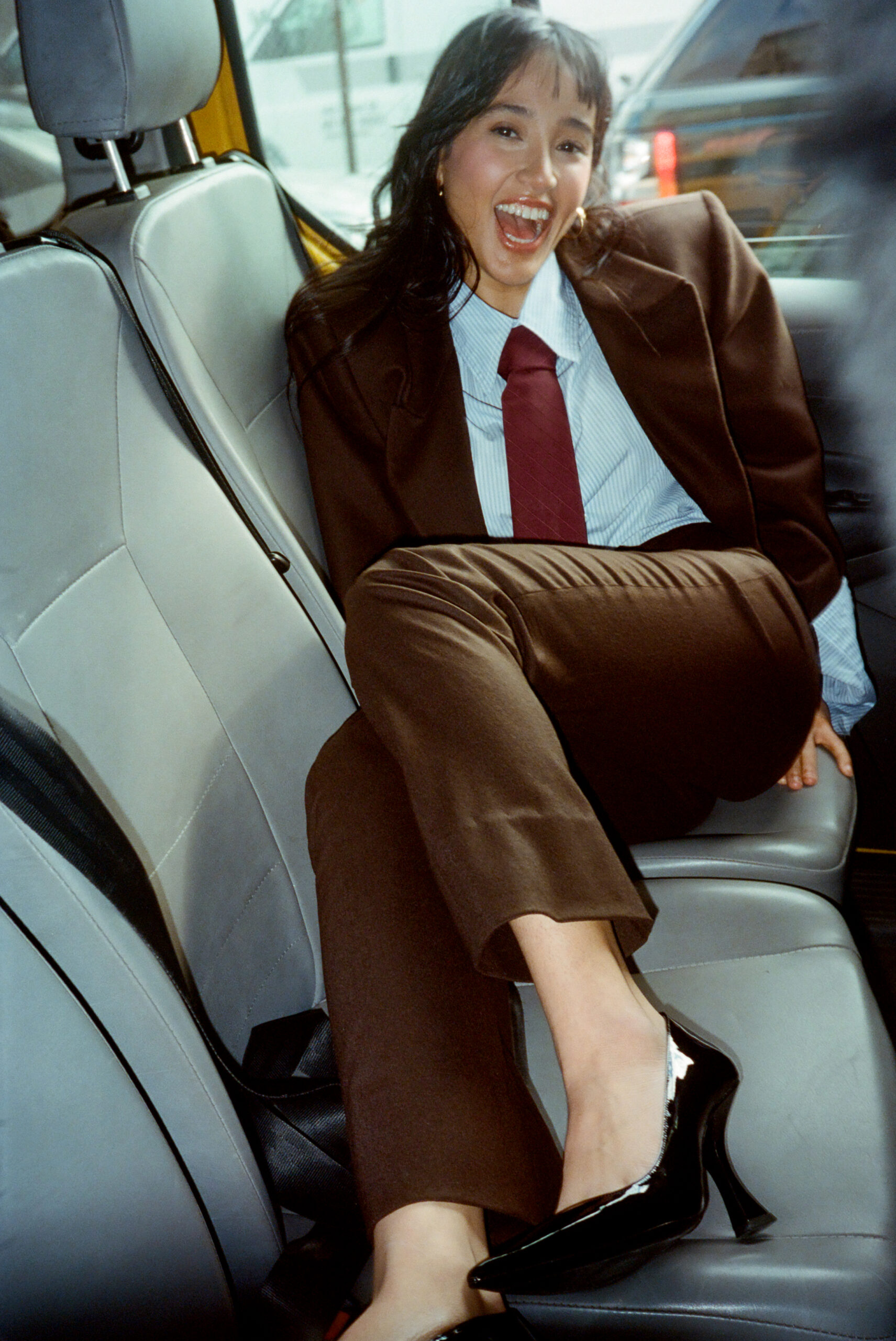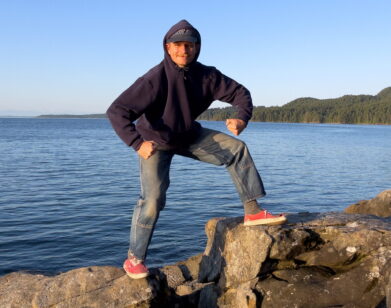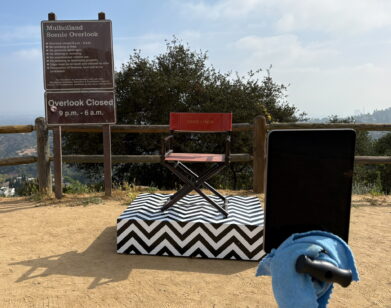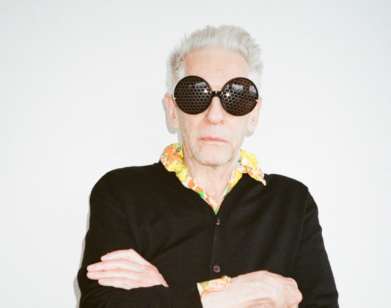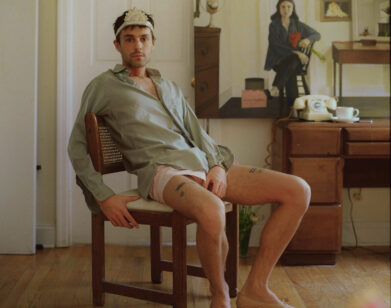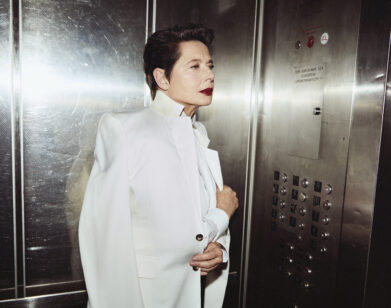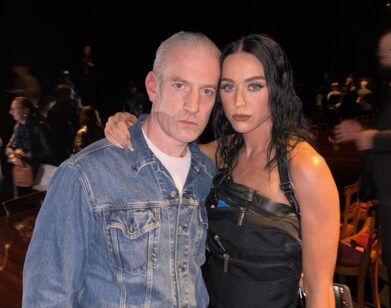NEWCOMER
Wally Baram of Overcompensating Tells Kyle MacLachlan How She Gets Into Flow State
Until recently, Wally Baram had more spent time in writer’s rooms than she had in front of the camera. As a stand-up comic, and then a staff writer on shows like Shrinking and What We Do in the Shadows, she became accustomed to the conventions of television writing: long hours at a roundtable, interspersed with chunks of what she calls “shooting the shit.” But then, during a workaday writing session on Overcomensating, Benito Skinner’s riotous and quietly touching new coming-of-age comedy on Amazon Prime, producers asked her to audition for the role of Carmen, someone with whom she already felt a certain kinship. “There was this character of a girl with frizzy hair from New Jersey who was awkward and overcompensating,” Baram remembers. “I was like, ‘That feels mighty similar.'” Acting alongside Skinner, who plays Benny, a closeted former football player navigating the hormonal highs and lows of freshman year at college, Baram emerges as the show’s breakout star, one half of an unlikely but ultimately inevitable friendship. “As a writer, I was pretty literal with my understanding of what making a show was ahead of time,” Baram told Kyle MacLachlan, who plays Benny’s dad in the show, out on May 15th. “But when I was actually acting, I was almost embarrassed at how one-dimensional my understanding of the process was.” Below, she and the Twin Peaks star talk about the rite of passage that is awkward teenage sex, achieving a flow state, and working on the unusually encouraging set of Overcompensating.
———
WALLY BARAM: Gosh, thank you so much for agreeing to do this.
KYLE MACLACHLAN: Well, I’m excited because I get to learn more about you.
BARAM: Hopefully my internet is okay. I’m at a comedy festival in Austin right now.
MACLACHLAN: I was in Austin not long ago for South by, which is so much fun.
BARAM: We were almost going to premiere the show there, but then they needed to do some more work on it.
MACLACHLAN: I’m a little nervous. I always get nervous before something drops just because you just don’t know. But I had such a good feeling with it.
BARAM: Oh, you are so good. Have you seen it?
MACLACHLAN: No, I went in and did ADR. I did two tiny little pieces and it looked promising. It was hard to get a sense of it, but it looked cool.
BARAM: I’ve seen it and you are fantastic in it. You’re an absolute joy.
MACLACHLAN: You are so sweet. Thank you. I’ve seen some of the trailers with you and Benny sitting on the bed. That energy is perfect and so sweet and delightful. What happens when I see things like that is, I go back to when I was roughly about the same age. You really don’t know anything. You think you do, but you don’t. Just that brief little moment, I got to feel that.
BARAM: That moment actually speaks to her, even though you don’t really know it when you’re watching the trailer. She’s a very earnest character, in the way that college students are earnest and not very self-aware, but also are trying really hard.
MACLACHLAN: One of the things about the show that is so refreshing is that those moments are treated humorously, but they’re very real. I think that underscores the show. The truth of it is there, but of course it’s heightened in these wonderful ways and will be very entertaining.
BARAM: I had someone ask me, because my character has a lot of sex, how I felt about being objectified or sexualized in the show. I actually don’t feel particularly sexualized. All of the instances of sex feel like they contribute to plot and to the real college feel of the show. I remember being in college and having sex and being shocked. Growing up you think, “My young adulthood is this sexy time.” It’s sexualized in the media, it’s sexualized in porn. Then I was like, “This is the thing that you guys think is hot? I feel like a beached whale.” I thought we all must be doing it wrong.
MACLACHLAN: That’s so funny. You’re already thinking of it as a writer, and you’re an extraordinary writer. You’re in it, but you’re also observing it going, “Wait a minute, this is what I’m feeling. This is the experience and this is the expectation.” Did you know quite early that this was going to be it? Or did it kind of come to you slowly?
BARAM: In the back of my head, I always thought this would be an incredibly cool path. In the very beginning I did the thing that Benny does in the show and that we all do, where you’re at first negotiating with what you want and the expectations of you. In the very beginning I thought I wanted to be a cowgirl, of all things. But my parents wanted me to go into politics, of all things.
MACLACHLAN: Interesting.
BARAM: So I went to a school that had an academic program but also taught you really practical western cowboy equestrian skills.
MACLACHLAN: What kind of school is this? This is amazing.
BARAM: Yeah, it’s in Ojai, California. You had to get up at 5:00 AM, muck a horse stall after school every day. You rode the horse, you did horse chores. They had this quote that was, “What’s good for the outside of a horse is good for the inside of a man.” So ultimately, even if you didn’t go into horse exploits, it would help you build character. And it did.
MACLACHLAN: How interesting.
BARAM: Eventually I was like, this is too much labor. I’m too short. I was always struggling to get the saddle on the horse. Then I was like, let me try one more pipe dream, and then if none of the pipe dreams work, then I’ll go into perhaps—
MACLACHLAN: Politics.
BARAM: That type of thing. But then I went into stand-up, and from stand-up into writing, and then my first time acting was on the show.
MACLACHLAN: Stand-up is the pinnacle of what we do. I mean, theater is up there. But stand-up is just you and a mic and an audience. I’ve never done it, but it’s the most frightening thing, thrilling highs and lows. I can only imagine.
BARAM: I think acting is so much harder, which is interesting. You don’t have any audience feedback when you act. It threw me entirely, but maybe that’s also [my lack of] experience.
MACLACHLAN: I did a show called How I Met Your Mother, which was my first half-hour. And then I did a short-lived comedy called Carol’s Second Act. And in How I Met Your Mother, I played a real fun character and we didn’t have an audience. We had a very lively crew and they would laugh and they were very helpful, but it felt more like I was doing a play or a movie. You’d cut, you’d go back, you’d do it again. But the idea that you have to be perfect wasn’t part of the equation. On Carol’s, it was a live audience, so I realized I was not good. I was scared and nervous, I couldn’t get out of my way. I said, “Why is this?” And I said, “Because you wanted to be perfect every time.” If I forgot a line or something, I felt like, “Oh, shit. I really fucked up.” I couldn’t get past that. Whereas if I was doing it without an audience, it’s like, “Oh, we’re just doing a bunch of rehearsals. Let’s try stuff.” Have you done stage work?
BARAM: I’ve not.
MACLACHLAN: I think you would like it.
BARAM: Really?
MACLACHLAN: You get the feedback from the audience because you really feel them, at least I do. It must be a bit like stand-up. They tell you straight away, but you also get to do the acting part and you get to feel your way through the character. It gives it some truthfulness. Reality, I guess.
BARAM: What you just described on Carol’s, I felt on set a lot. When I was thinking about my greatest challenge throughout this process, one was trying to decide what kind of actor I wanted to be and what tools I’d be using. My performance and my emotional accessibility was constantly obstructed by nerves and by the desire to be perfect and to get it right. But if you are nervous and trying to do something perfectly, you’re not going to reach whatever flow state you need to be.
MACLACHLAN: You just said a very good word: “flow state.”
BARAM: You believe in that?
MACLACHLAN: That’s exactly the place to aspire to, which is hard to get to when you’re nervous and self-aware. But I’ve definitely learned, and you learn every show, that there is this moment just before you start to roll where you just go, “Fuck it.” You get into a flow state that allows you to go. Sometimes the lines don’t come or you’re in another space, but you’re having fun and going with it. Believe me, whatever you’re describing in terms of nerves was not evident at all when we were working together. From my little perspective, it was fantastic.
BARAM: Acting was not what I anticipated going in—that it would be this art where right before the camera rolls, I would do the same thing that I do with stand-up, where I say, “Fuck it, whatever happens, happens. I’m going to play around in the space.” Previously I thought about acting from the writer’s perspective where it’s like, “I make these words and then they say these words.” What happens on set is they use the words as a blueprint to create an entirely different beast. It was interesting and unexpected. As a writer, I was pretty literal with my understanding of what making a show was ahead of time. But when I was actually acting, I was almost embarrassed at how one-dimensional my understanding of the process was.
MACLACHLAN: So much of it is influenced by the people around you. There’s that old trope, “acting is reacting,” and it’s very true. You have your own direction, but it’s also fun to respond to something that Benny’s doing or the dynamics in the scene. It helps keep me in the moment. But I would love to spend some time in a writer’s room. That would be very interesting. How is that? Because you come from that tradition. Shrinking is one of my favorite shows. In fact, we had a dinner last night for Phil Stutz, who is the psychiatrist who Harrison Ford bases his character on. He has another book out. We had a little book party and I’ve known Phil for years, and then I come to find out that you’ve been working on Shrinking.
BARAM: Shrinking was such a great job for me, particularly when I got it. I began my career working in rogue guerrilla environments in digital where everyone was trying to emulate what they thought a writer’s room should look like. I learned what to do in many cases, but also what not to do. Once I started in TV, I worked under some great people, including Bill Lawrence on Shrinking, and then before that, Paul Simms on What We Do in the Shadows, Greg Garcia who did My Name is Earl and all those TV shows. I worked under people that had done this quite a few times and had a strong understanding of how they get the most out of their creative process, so I picked up different skills. Then by the time I hit Shrinking, a group of six or seven almost exclusively upper-level producers, I got to learn and bask in people that were so smart, but also kind and easygoing, which is important because you’re in a room with these people for eight hours. The hours are crazy.
MACLACHLAN: Oh my god, that would be exhausting.
BARAM: It is pretty nutty.
MACLACHLAN: It’s like a marathon versus the 100-yard dash.
BARAM: Exactly. When I worked on What We Do in the Shadows, in the beginning of every day you shoot the shit. You talk a little bit of gossip, you talk the news. He allotted so much time to hanging out. I don’t know if it was strategic, but for me it had the collateral benefit of everyone being comfortable and chummy going into the creative process. Every day you’d have 20 minutes plus, sometimes a lot more, of just hanging out. That meant that when we went into pitching ideas, everyone felt open to everyone else’s ideas and friendly, which creates the space to be vulnerable.
MACLACHLAN: That’s so true. It’s what I felt working with David Lynch. That space in front of the camera is an important space to keep pure, open, and full of joy, love and acceptance. Even in a hard scene or a challenging scene or an emotional scene or an angry scene, you have to take care of that space. David was always so joyful and welcoming and accepting, and if there was something that went a different way, he would very gently bring it back and give the actors a couple of things to think about. It was magical to be able to do that, and it is so important to create that space, whether it’s a writer’s room or in front of the camera or in life, too, with family.
BARAM: Thank you for sharing that with me. It’s so surprising to me when I hear these stories of creative people in positions of leadership when they’re maniacal and domineering because it’s so antithetical to the creative process. How does anything great get done in that environment? I don’t even know.
MACLACHLAN: You make a good point. And yet it does. But I agree with you, it’s not the nicest place to be and it’s not a heart space, necessarily. It’s a different kind of chakra. Maybe that’s the way to look at it. But it does make for some incredible work and performances. But as an actor, as a person, it’s not my first choice.
BARAM: I’ve never quite been in that type of situation. I wonder how I’d fare. I feel like comedy always thrives when you’re confident. We had that on Overcompensating. That was my favorite and biggest surprise working with Benny. I was like, “How are you a first-time show creator and you’re so joyful and fearless?” My experience with first-time showrunners is that usually they’re so afraid that something is going to be bad that they don’t trust the people that they’re around.
MACLACHLAN: It did feel like he’s done this before. How did you connect with Benny? How did you find your way into the world of Overcompensating?
BARAM: My stand-up is usually me describing a situation in which I’ve tried to be something that I’m absolutely not and it backfiring entirely. When I heard there was a show about overcompensating, everyone around me was like, “Let’s see if we can get her a meeting.” Then I met for the writer’s room and there was this character of a girl with frizzy hair from New Jersey who was awkward and overcompensating. I was like, “That feels mighty similar.” Then we were able to pull from my personal experiences, but that’s ultimately how I found my way in.
MACLACHLAN: I think it’s wonderful when those two worlds collide and that you were up to do it. It’s like it almost wasn’t your choice. It found you, knocked on the door and said, “You’re going to go this way now.”
BARAM: Thank you, Kyle. I think we circled some good, creative themes in this one.
MACLACHLAN: Oh, yeah.
BARAM: Confidence, flow state, and creative process. I’m glad we got to talk about all this.
MACLACHLAN: I’m glad you were up for it, too.
Hair: Blake Erik
Makeup: Rebecca Restrepo

